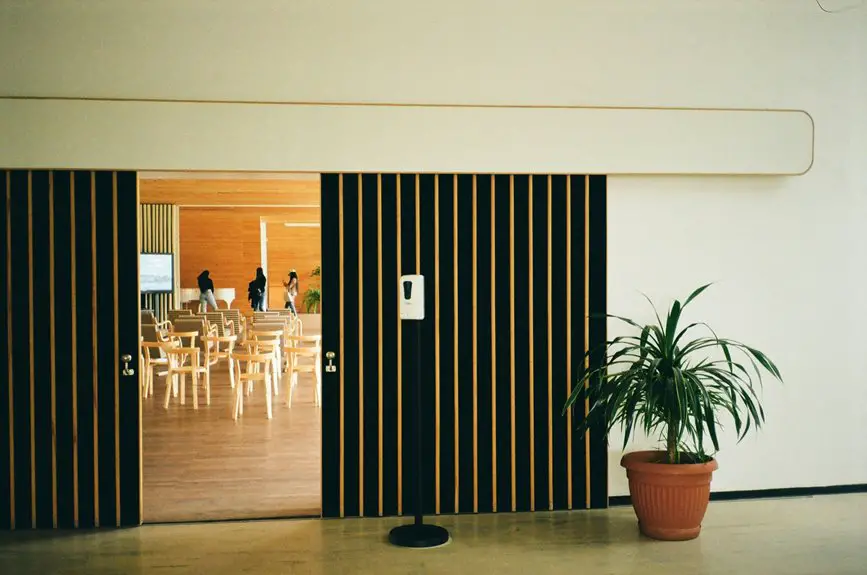Hanging plants are a fantastic way to save space in your home office while boosting productivity and well-being. They enhance your workspace's aesthetic, improve air quality, and reduce stress levels. By elevating plants above your desk, you free up valuable space and maintain a clutter-free environment. Consider options like pothos or spider plants that thrive in office conditions. Plus, there's more to learn about creative ways to incorporate these greens into your workspace for added benefits.
Key Takeaways
- Hanging plants free up desk space, allowing for a clutter-free and organized workspace.
- Utilize ceiling hooks to create vertical gardens, maximizing limited floor space.
- Wall-mounted shelves can display multiple plants at varying heights, adding visual interest.
- Stylish macramé hangers can enhance decor while keeping plants off surfaces.
- Position small hanging planters on window ledges to utilize natural light without occupying desk area.
Benefits of Hanging Plants in Your Home Office
When you incorporate hanging plants into your home office, you not only enhance the aesthetic appeal but also boost your overall well-being.
These plants can improve air quality, filtering out toxins and increasing oxygen levels, which helps you stay focused and energized. Additionally, the presence of greenery has been shown to reduce stress and anxiety, creating a more calming work environment.
By utilizing vertical space, hanging plants free up valuable desk area, allowing you to maintain a clutter-free workspace. Furthermore, they add a touch of nature, which can inspire creativity and productivity.
You'll find that having these plants around helps you feel more connected to nature, making your home office a more pleasant and inviting place to work.
Top 5 Hanging Plants for a Productive Workspace
Hanging plants can transform your workspace into a vibrant and motivating environment. Here are the top 5 plants you should consider for boosting your productivity:
| Plant Name | Light Requirements | Benefits |
|---|---|---|
| Pothos | Low to bright | Air purification, easy care |
| Spider Plant | Indirect sunlight | Non-toxic, improves air quality |
| String of Hearts | Bright, indirect | Unique appearance, drought-tolerant |
| Boston Fern | Moderate | Humidity boost, stress relief |
| Philodendron | Low to bright | Resilient, enhances mood |
Incorporating these hanging plants not only saves space but also adds a touch of nature, which can inspire creativity and focus while you work. Choose the right ones for your office and enjoy the benefits!
Care Tips for Your Hanging Plants
To keep your hanging plants thriving, it's essential to understand their specific care requirements.
First, ensure they receive the right amount of light; most prefer bright, indirect sunlight.
Water your plants when the top inch of soil feels dry, but avoid overwatering, which can lead to root rot.
Fertilize during the growing season, typically spring and summer, using a diluted liquid fertilizer every month.
Regularly check for pests like spider mites or aphids, and treat them promptly with insecticidal soap if needed.
Prune any dead or yellowing leaves to encourage healthy growth.
Finally, consider the humidity levels in your home office; if it's low, mist your plants occasionally to keep them happy.
Creative Ways to Incorporate Hanging Plants Into Your Office Design
If you're looking to breathe life into your office space, incorporating hanging plants can transform your environment into a refreshing oasis.
Here are some creative ways to do it:
- Use Ceiling Hooks: Hang lightweight plants from ceiling hooks to create a floating garden effect.
- Wall-Mounted Shelves: Install shelves at different heights and place hanging plants on them for visual interest.
- Macramé Hangers: Use stylish macramé hangers to add texture and personality while showcasing your plants.
- Window Ledges: Position small hanging planters on window ledges to utilize natural light and brighten your workspace.
Enhancing Your Office Atmosphere With Hanging Plants
While you mightn't realize it, adding hanging plants can significantly enhance your office atmosphere, making it more inviting and productive.
These vibrant green additions not only improve air quality but also create a calming environment that can reduce stress. When you look up at lush foliage, it can inspire creativity and boost your mood.
Choose plants that thrive in your office conditions, like pothos or spider plants, and hang them at varying heights for visual interest. This layered approach adds depth to your space without taking up valuable desk real estate.
Plus, the gentle movement of leaves can provide a soothing backdrop as you work. By incorporating hanging plants, you're not just decorating; you're transforming your workspace into a refreshing oasis.
Frequently Asked Questions
Can Hanging Plants Improve Air Quality in My Office?
Yes, hanging plants can improve air quality in your office. They absorb carbon dioxide and release oxygen, helping to filter out toxins. Plus, they add a refreshing touch to your workspace, boosting your mood and productivity.
How Do I Choose the Right Hanging Planter for My Space?
To choose the right hanging planter, consider your space's light conditions, the plant's needs, and your style. Select materials that complement your decor, and ensure the size fits well without overwhelming your area.
Are There Any Hanging Plants That Thrive in Low Light?
Yes, several hanging plants thrive in low light, like pothos, spider plants, and peace lilies. They're perfect for darker spaces, adding greenery without demanding too much sunlight. Just ensure you water them appropriately!
How Can I Ensure My Hanging Plants Don't Become a Distraction?
To ensure your hanging plants don't distract you, position them away from your main workspace. Choose plants that require minimal care, and maintain a regular watering schedule to keep them healthy and visually appealing without demanding too much attention.
Do Hanging Plants Attract Pests in a Home Office Environment?
Yes, hanging plants can attract pests like spider mites and aphids. To prevent this, regularly inspect your plants, maintain proper care, and consider using natural pesticides. Keeping the area clean helps minimize potential infestations as well.
